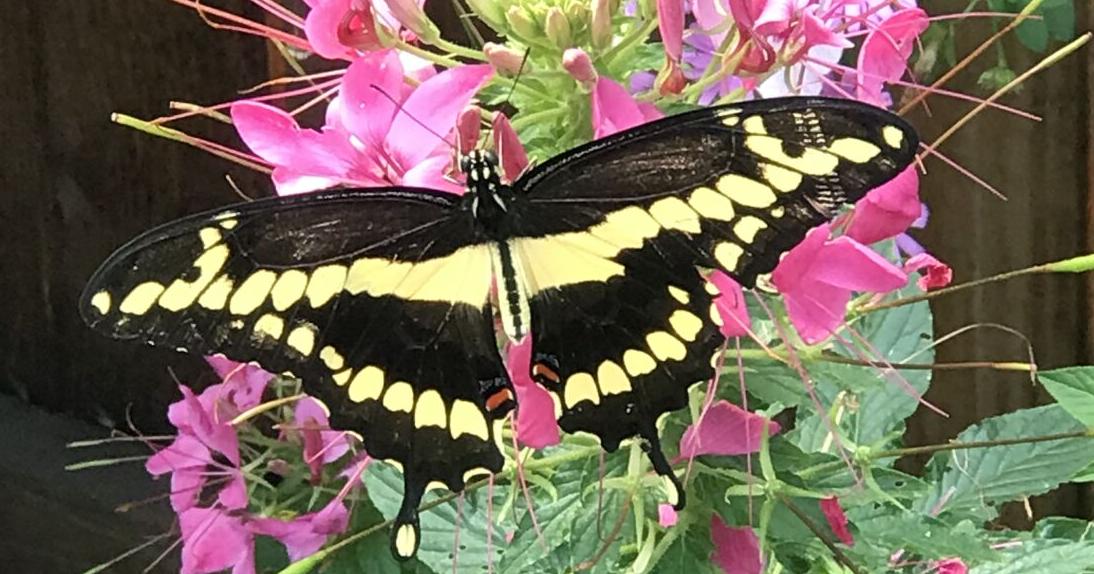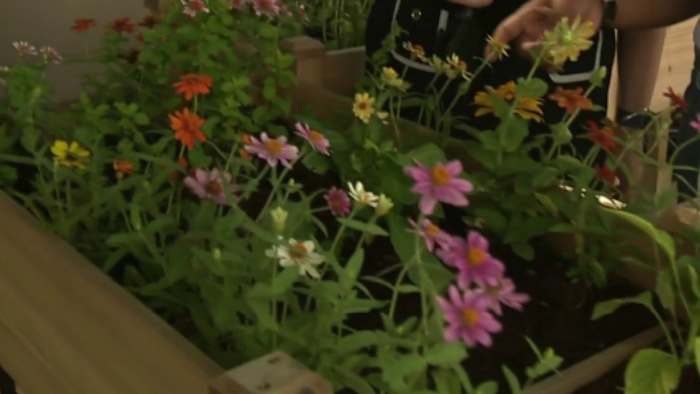This story is part of a series on NHPR’s Morning Edition in which we explore how people are addressing food insecurity in New Hampshire. Tell us your thoughts on local food access at [email protected].
One in 10 Granite Staters don’t have consistent access to enough food, including fresh fruits and vegetables, according to a new report from the nonprofit Feeding America. As a result, some people have turned to gardening to get the nutritious food they need.
Deborah Eckland of Concord is one of them. She started her garden in 2020 with her neighbors on a small plot squeezed between two apartment buildings and a paved parking lot.
“So in this small space, we did about eight tomato plants,” Eckland said, gesturing to the patch of freshly tilled dirt, ready for planting. “So it was tomatoes, peppers – from bells to jalapenos. And then some pumpkins and gourds.”
At the start of the pandemic, food supply chains were disrupted and panicked customers cleared store shelves.
“When I walked in and the shelves were empty, that freaked me out,” Eckland said. She’s 64, and says she’d never seen that happen before.
“Living in Texas, I’d lived through hurricanes where people just rush in the store and empty everything, but I had never seen anything like this go on for days and days. And I knew that if I couldn’t grow anything, I might be in trouble.”
Eckland used her SNAP benefits, often called food stamps, at the farmers market to buy starter plants for her vegetables. Over time, she cut her food expenses in half.
“The first year when we grew vegetables, we ended up with 10 pounds of green tomatoes,” she said. “So I ended up canning those. So 2020 didn’t only teach me that I could grow in such a small space, but it also taught me that I was able to do that as well.”
A study from the Universities of Vermont and Maine found that more people in New England turned to gardening and other ways to get food, like hunting, to be more food secure during the pandemic.
People also experience food insecurity by not having access to culturally relevant food, and gardening can be a solution to that, too. That was the case for Suk Rai, of Concord.

“I came here in 2011, and since 2011 I am doing my gardening down here,” Rai said of his plot at the Sycamore Community Garden in Concord.
When Rai and his wife Bhima moved to Concord from Nepal, they couldn’t find Nepali produce in local grocery stores, and they say they didn’t know how to cook American food. So they joined the Sycamore Community Garden where they grow vegetables commonly found in Nepal, like ishkush, a kind of squash.
“This is a good vegetable in our country,” Rai said. “Sometimes we can boil it and we can eat it, and sometimes we cut it down like potatoes and make it fry. That way we can eat it with the rice.”
One group in Nashua is also working to make culturally relevant food and fresh produce more accessible. The nonprofit Grow Nashua provides garden education and community garden plots in the city’s food deserts – areas where it’s difficult to get to a grocery store with affordable, healthy food.
But Justin Munroe, the co-executive director of Grow Nashua, says backyard and community gardening alone isn’t going to fix food insecurity.
“The number of pounds that you can actually grow doesn’t really match up very well with the amount of pounds of veggies that a family needs to eat,” Munroe said.
And harvesting food also takes a lot of time and energy. That’s something that people who work, especially multiple jobs, might not have.
Munroe says stressors like high rents and inflation are driving food insecurity locally, and individuals can’t solve that on their own.
Grow Nashua tries to meet the need for fresh food with the “Lil’ Free Veggie Truck.” During the growing season, they distribute free, local produce to low-income residents seven days a week from the truck.

Munroe’s observed that when they hand out the fruits and vegetables, some people are unfamiliar with the taste of nutritious, locally grown food.
“People are thrilled with the produce and they say, ‘Where did you get this? This is so good.’ That’s one of the things about food access is that the quality of food matters,” Munroe said. “I think that’s also something that’s valuable to establish people’s self worth. You’re getting the best tomato that we can possibly find, and that makes someone feel good.”
Even if gardening can’t fill all of a person’s food needs, it has other benefits to the environment and gardeners’ physical health.
Suk Rai says his garden plot connected him with new friends who share seeds and gardening techniques from their cultures.
“Some of them are from Africa, some of them are from Nepal. Some of them are from Germany or somewhere else,” Rai said. “So it is good for everybody, not only me, but for everybody who wants to communicate with the community.”








